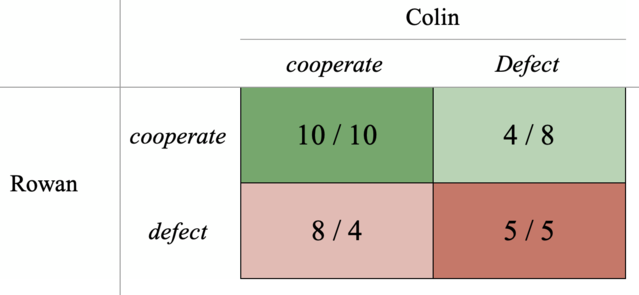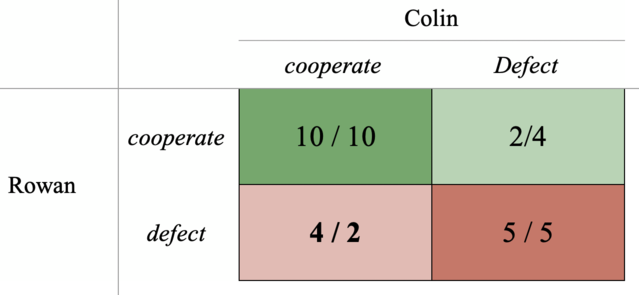Teamwork
Why We Behave Spitefully
Spitefulness is expensive. So why do we do it?
Posted October 9, 2021 Reviewed by Devon Frye
Key points
- Spiteful behavior can be modeled with game theory.
- Spite can come from desperation, strategic signaling, or lack of thought.
- Spite can mask as forgiveness.
I am a sick man... I am a spiteful man. I am an unpleasant man. [. . .] It was not only that I could not become spiteful, I did not know how to become anything.
—Dostoevsky, 1864, Notes From Underground
To spite somebody is to treat that person with deliberate malice or contempt. It is to thwart that person’s legitimate aims. To spite somebody is to engage in such actions in spite of good reasons not to—almost in spite of oneself. "Spite defies logic," Charlie Tyson (2021) complains in The Atlantic. So why do humans occasionally choose spite?
The psychological literature is sparse. Marcus et al. (2014), who developed a psychometric scale to assess individual differences in trait spitefulness, noted that at the time, none of the major psychology journals had picked up the topic. Marcus’s research showed that “spitefulness was positively associated with aggression, psychopathy, Machiavellianism, narcissism, and guilt-free shame, and negatively correlated with self-esteem, guilt-proneness, agreeableness, and conscientiousness” (p. 563). Spitefulness squares the Dark Triad.
Can anything positive be said about spite? Perhaps, but the evidence is ambiguous. In the well-known "Ultimatum Game," a player who receives an unfair offer from another player may reject that offer, knowing that as a result, neither player receives any money (Krueger, 20021). By the lights of conventional game theory, rejecting a positive but comparatively disappointing offer is irrational since it is better to get some money than it is to get no money. A vetoed offer signals the receiver’s displeasure to the proposer and thereby encourages more equitable offers in the future.
Even in a one-shot game, vetoing a shabby offer is not necessarily irrational as the vetoer might be sending a "don’t-mess-with-me" message to a real or imagined audience. In a recent study, we found that third-party observers rate a maltreated vetoer highly both on traits related to morality and on traits related to competence (Krueger et al., in press). As it stands, these results may suggest that a psychological experience of spite mediates the effect of experienced unfairness upon retaliation. However, it may not be spite at all that mediates the veto, but a clever anticipation of social or reputational rewards bestowed by the audience.
Can we set up a pure test of spiteful action? The answer is yes. Social game theorists have long studied individual differences in social preferences and social value orientations. Their research involves so-called decomposed games, where players choose between pairs of outcomes; they do not play the full game, in which their outcome would depend on both their own choice and the choice of another player.
Most people are prosocials as they prefer efficient outcomes where everyone wins. Other people are individualists as they prefer to maximize their own outcomes without regard for the other. Very few people are true altruists who wish to see the other do well even at a cost to themselves. Finally, there is a sizable minority of competitors, that is, people who settle for less if this means the other gets even less still (van Lange, 1999). Competitors, we may say, are being spiteful (Krueger, Evans, & Heck, 2017).
To put spiteful competitiveness back into a full interdependent context, consider the game described in the first matrix. Rowan and Colin do well, individually and collectively, if they both cooperate. All other combinations make them worse off. In this game, which is a variant of the "Stag Hunt," a person might defect for fear that the other defects. The lone defector can still do 3 points better than the mutual defector.

Now consider the game described in the second matrix. Much is the same: mutual cooperation and mutual defection are Nash equilibria, and the probability with which a rational player cooperates is 1/3 [Note]. Now, however, the defector must hope that the other player defects as well. But this hope negates spite. If I am spiteful to you, hoping that you respond with spitefulness, I am not being spiteful at all. True spite—perhaps irrationally—is competitive. I hope that I can outspite you.

Suppose Rowan and Colin find themselves in the dc (4/2) cell of the matrix, and suppose that Colin is given a chance to unilaterally change strategy. If Colin sticks to cooperation, he ends up with his worst-case outcome, while knowing that Rowan, the defector, has the second-worst outcome. Rowan’s initial act of defection may be motivated by fear or spite, but Colin’s refusal to defect in turn is spite in its crystallized form.
There is a lesson here. Suppose you have been treated with dismissiveness or disrespect, and suppose you know that both you and the offender would feel a little better if you took the bait and retaliated in kind—in a catharsis of conflict of sorts. Now, under these conditions, you can shame the offender by not retaliating with defection. This is an odd conclusion because it suggests that forgiveness, if delivered by cold-blooded inaction, can sting the offender. The question remains, are you willing to pay the price?
Note. The probability of cooperating is given by the ratio of (P-S) over (R-S-T+P), where the letters within the second set of parentheses respectively refer to the payoffs for mutual cooperation, unilateral cooperation, unilateral defection, and mutual defection.
For an excellent essay with an overview of research on spite in humans and other animals see Patel (2018).
References
Krueger, J. I. (2021).. How counteroffers change the ultimatum game. Psychology Today Online. https://www.psychologytoday.com/us/blog/one-among-many/202104/how-count…
Krueger, J. I., Evans, A. M., & Heck, P. R. (2017). Let me help you help me: Trust between profit and prosociality. In P. A. M. Van Lange, B. Rockenbach, & T. Yamagishi (Eds.). Social dilemmas: New perspectives on trust (pp. 121-138). Oxford University Press.
Krueger, J. I., Grüning, D. J., & Sundar, T. (in press). Power and sociability. In J. P. Forgas, W. D. Crano, & K. Fiedler (eds.), The psychology of sociability. The Sydney Symposium on Social Psychology, 23. Taylor & Francis.
Marcus, D. K., Zeigler-Hill, V. Mercer, S. H., & Norris, A. L. (2014). The psychology of spite and the measurement of spitefulness. Psychological Assessment, 26, 563-574.
Patel, N. (2018). 10 scientific facts about spite. https://www.mentalfloss.com/article/554980/scientific-facts-about-spite
Tyson, C. (2021). Why are we so spiteful? The Atlantic, May13. https://www.theatlantic.com/culture/archive/2021/05/why-are-we-so-spite…
Van Lange, P. A. M. (1999). The pursuit of joint outcomes and equality in outcomes: An integrative model of social value orientation. Journal of Personality and Social Psychology, 77, 337–349.




